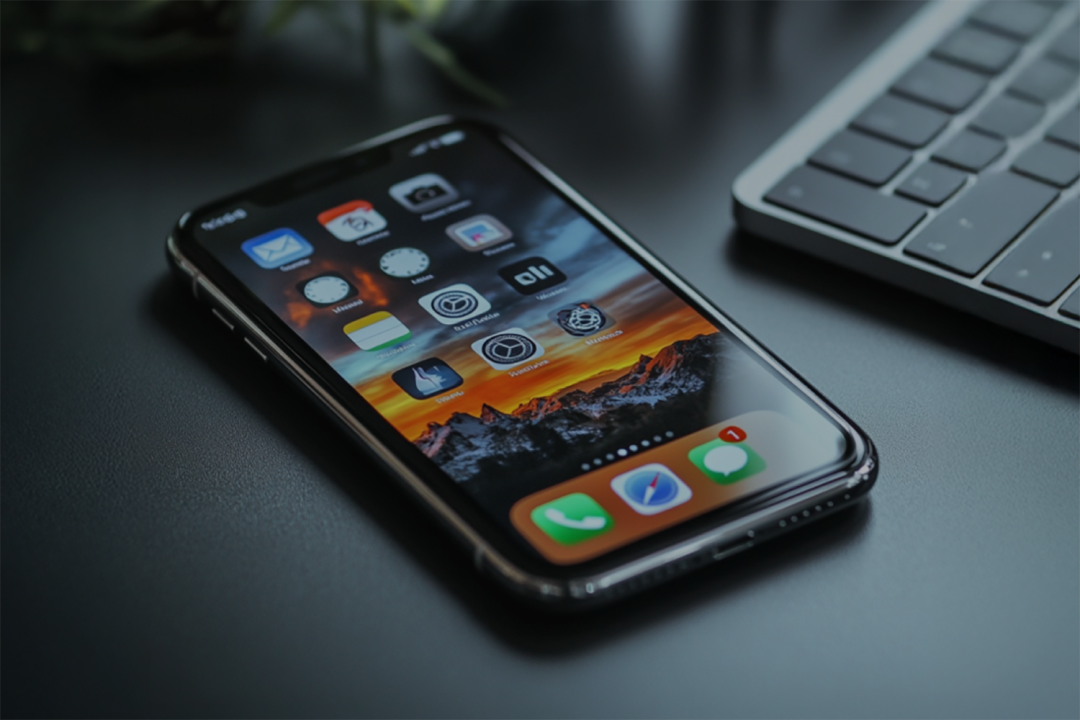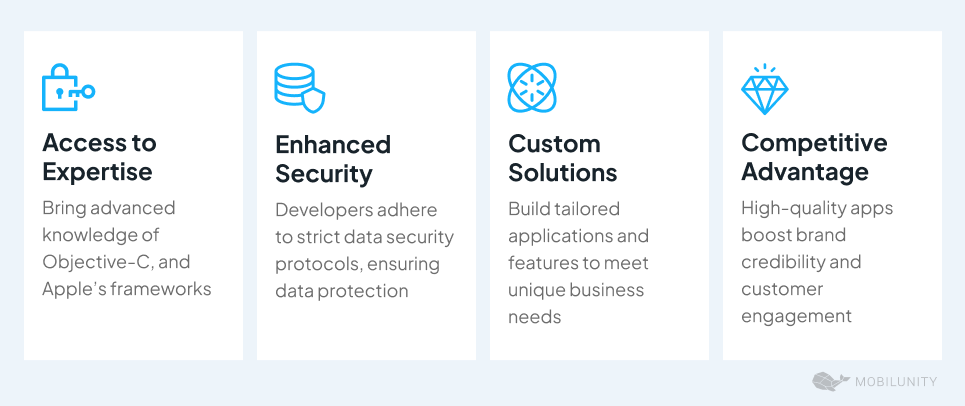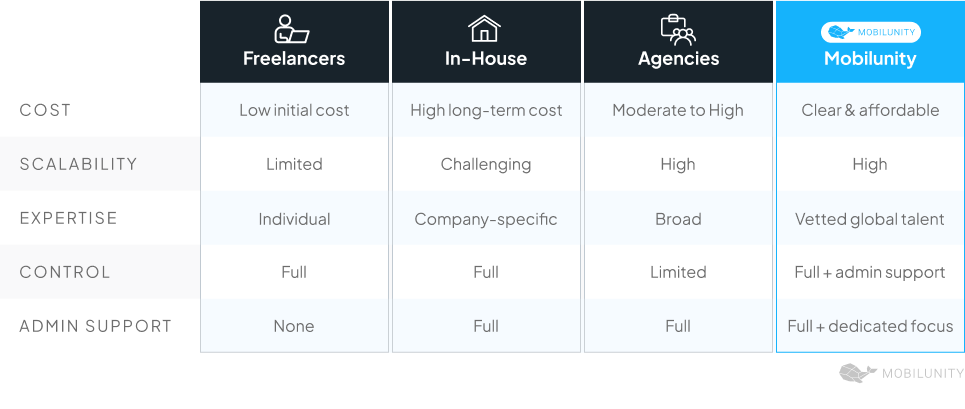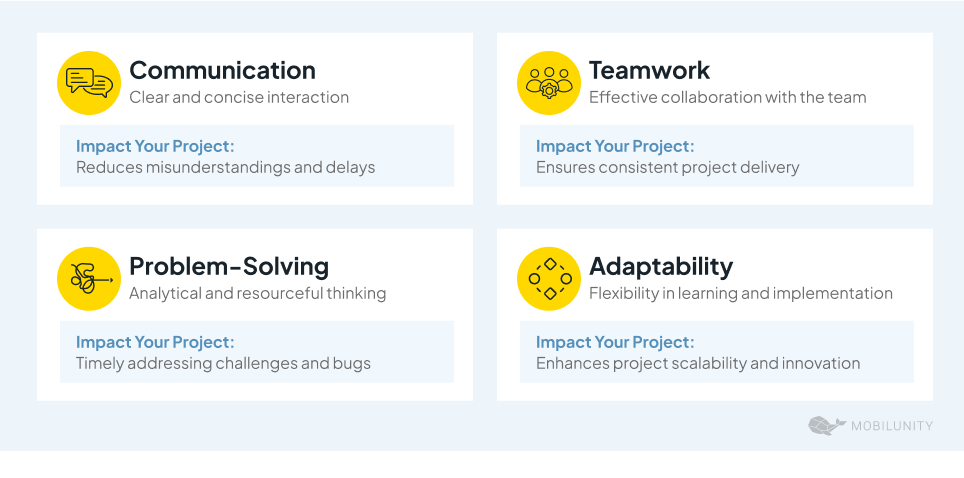Why you should hire iPhone app developers: Mobilunity’s guide to hiring top talent remotely
This article gives a comprehensive view to hiring top iPhone app developers remotely

In today’s digital economy, iPhone applications play a pivotal role in connecting businesses with consumers – driving engagement and revenue. The Apple App Store, hosting approximately 2 million apps, is a testament to its vast reach and influence (based on the research by Statista).
To effectively tap into this yielding yet highly competitive market, companies are looking for specialized iPhone app developers. These professionals provide the expertise to create an app not only tailored to business needs. The final product should align with Apple’s strict guidelines, user expectations, and high performance standards. Hiring dedicated iPhone app developers can help business owners and tech leaders come up with the latest iOS features, providing a seamless and highly competitive user experience.
This article gives a comprehensive view to hiring top iPhone app developers remotely. We’ll have a look at the critical benefits of engaging specialized developers. Next, we’re going to provide a complete guide to hiring, managing, and maximizing the potential of iPhone app developers – to get your app developed in the right way.
Who are iPhone app developers?
These specialized software engineers create apps for Apple devices like iPhones, iPads, Apple Watches, and Apple TVs. Their primary focus is on adhering to Apple’s design guidelines and maintaining compatibility within the iOS ecosystem. They should be skilled in Swift and Objective-C and frameworks like UIKit and CoreData. Sometimes their skills involve using Java, for example, to bring an Android app to the App Store. Below are the most common roles and responsibilities of iPhone app developers:
| Role | Responsibility |
| iOS App Architect | Designing the app’s structure, defining workflows, and ensuring alignment with your business objectives |
| iOS Developer | Coding and developing apps using Swift and Objective-C programming languages |
| UI/UX Designer | Creating visually appealing and user-friendly app interfaces in accordance with Apple’s guidelines |
| Quality Assurance Engineer | Testing your app for functionality, usability, and performance to ensure a bug-free user experience |
| Maintenance Specialist | Providing updates and fixes to keep your application running smoothly and securely over time |
Why hire an app developer for iOS?
iOS and Android app development are different. Businesses that target iOS users can get significant competitive advantages. Hiring proficient iPhone app developers ensures your applications are developed to the highest standards, meeting user expectations while aligning with business goals.
However, collaboration with iPhone developers has clear benefits and potential drawbacks. Challenges like talent acquisition and the app development cost exist – but they can be mitigated with the right hiring approach, such as partnering with a trusted provider of global talent solutions like Mobilunity.
Benefits of hiring iPhone app developers
Access to a Premium Market. iOS users commonly have higher purchasing power compared to Android, making them a valuable target audience. iPhone apps dominate industries like gaming, retail, social platforms, healthcare, and education.
Scalable and Secure Apps. iPhone developers build custom-made applications that are scalable to grow alongside your business. Apple’s strict guidelines and compliance ensure apps are secure and provide a high level of data privacy.
Seamless Integration. Professional developers put a strong emphasis on smooth integration with Apple’s ecosystem, including Apple Pay, HealthKit, Siri, and similar apps. This contributes to a broader reach to the audience.
High-Performance Standards. iPhone apps are optimized for high performance and innovative user experience. Here performance is more than critical, especially for projects with complex features or a large user base.

Challenges of hiring iPhone app developers
Finding the Right Talent. Efficient iOS software development requires specialized skills, including proficiency in Swift and hands-on experience across the whole Apple’s ecosystem. Additionally, hiring developers with industry-specific experience may charge higher – and can require professional tech vetting and more time.
App Developer Costs. When comparing iOS and Android, the cost of hiring an app developer for Apple can be more expensive – mainly due to unique requirements and specific tools/frameworks. Without proper management and control, project timelines can be extended, potentially leading to increased time-to-market and budget overruns.
Keeping Up with Technology Trends. The iOS ecosystem is constantly evolving and adds up new user experiences. With new updates, APIs and innovative features are introduced regularly. That’s why developers must stay updated with the latest technologies and UX trends to keep their expertise relevant.
Post-Launch Maintenance. Constant development of the iOS ecosystem results in regular updates. This drives the need for supporting new iOS versions and ever-growing user demands. Eventually, you will need to ensure ongoing collaboration with developers to keep your application up-to-date.
| Challenge | Impact | Solution |
| Talent Shortage | It may be difficult to find skilled developers with niche skills / tech stack | Good vendors have large talent pool & extensive tech vetting capabilities |
| High Development Costs | Premium tools and expertise may potentially increase initial investment | Offshore or nearshore hiring can be a cost-effective yet high-quality alternative |
| Complex Project Management | Oversight is required to avoid possible delays and misaligned expectations | Using PM tools, establishing clear workflows & communication channels |
| Long-Term Maintenance | Developers must be available for ongoing post-launch updates and bug fixes | Choosing a hiring model that covers talent retention for ongoing collaboration |
Types of hiring and pricing models for iPhone app development
If you want to hire iPhone app developers, selecting the right hiring model is critical to ensuring the success of your project. Depending on your project’s scope, expected timeline, and available budget – you can typically choose between freelancers, in-house developers, or agencies. Now let’s move on to the next comparison – a breakdown of each model, including its advantages, drawbacks, and how you can get a well-balanced solution that combines the best aspects of these models.
Freelancers
Freelancers are self-employed specialists who work independently on specific software development tasks or projects. This model is ideal for short-term projects or businesses with limited budgets.
| Pros | Cons |
| Cost-Efficiency. Often charge lower rates than agencies or full-time employees. | Limited Scalability. May not be suitable to handle large or complex projects. |
| High Flexibility. Easy to scale up or down depending on your project needs. | Accountability Issues. Lack of commitment or oversight can impact project predictability. |
| Diverse Talent Pool. Access to global talent with specialized skills. | Communication Barriers. Time zone / cultural differences, inconsistent availability can pose a challenge. |
In-house developers
In-house developers are full-time employees who are an integral part of your company. Best for long-term projects or strategic businesses that require ongoing support for their applications.
| Pros | Cons |
| Seamless Communication. Better alignment with company goals, as they are part of your team. | High Overhead Costs. Salaries, benefits, office space, and equipment can significantly increase overall costs. |
| Cultural Fit. Offer much easier integration into your company’s culture and development processes. | Limited Flexibility. Scaling the team up or down can be challenging, in-part due to legal concerns. |
| Consistent Availability. Full-time focus and maximum long-term commitment for your project. | Recruitment Time. Hiring in-house developers requires extensive recruitment capabilities and more time. |
Talent providers
Global talent vendors provide teams or flexible part-time iOS app developers who can handle even large-scale and complex projects. This model is ideal for businesses looking for the world’s best talents at cost-effective rates.
| Pros | Cons |
| Access to Expertise. Agencies provide a team or single specialist with diverse skill sets. | External Dependency. Maintaining some internal resources may be necessary to balance your capabilities. |
| Cost-Effective for Scale. Fixed cost or retainer models often result in more predictable investment. | Requires Clear Communication. Miscommunication can lead to misaligned deliverables. |
| Time-Efficient. Extensive hiring and tech vetting capabilities allow you to find the right people faster. | Variable Costs. Rates vary significantly depending on the agency’s location, reputation, and service model. |
Learn more about offshore iOS development, key factors influence developer compensation across the most popular geographies, and the average cost of hiring app developers in different countries.
Mobilunity: dedicated developers
Mobilunity provides a unique engagement model that combines the best of all three traditional hiring approaches. By offering dedicated teams or flexible part-time developers, this global talent provider can help you hire skilled iPhone app developers. They can work as an integrated part of your team or address specific areas of your project – while offering the best price/quality ratio, unprecedented level of flexibility, and opportunities for long-term strategic partnership.
| Pros | Cons |
| Transparency. Clear engagement models and straightforward pricing with no hidden charges. | Project Management. Mobilunity focuses on providing developers, but PM responsibilities remain with the client. |
| Scalability. You can easily adjust team size to match current project needs, seasonal workloads, etc. | Recruitment Period. Finding the perfect match may lead to a slightly longer time frame vs. hiring freelancers. |
| End-to-End Support. Full coverage, from recruitment to ongoing administrative / retention services. | Time Zone Differences. Working with a globally diverse team may need thorough time management & scheduling. |
Traditional engagement models vs. Mobilunity

By leveraging Mobilunity’s models, you can get the best of both worlds: professionals who integrate seamlessly with in-house teams, the cost-efficiency of agencies, and a global talent pool of pre-vetted experts unavailable so far.
Key Software Development Skills to Look For
Hiring the right iPhone app developer requires a comprehensive evaluation and vetting of their technical expertise, soft skills, and level of experience. Here are the most essential skills and qualifications to keep an eye on when selecting developers for your iPhone app project.
Core Technical Skills
A skilled iPhone app developer must possess a deep expertise in coding languages, tools, and frameworks essential for creating fully functional and high-quality applications.
Programming Languages. Developers are using Swift and Kotlin, Apple’s modern languages for iOS software development. Objective-C, a legacy language, is often used in maintaining older applications.
Development Tools. Xcode – Apple’s Integrated Development Environment (IDE) for iOS applications.
Core iOS Frameworks. Core Data, UIKit, JSON Handling for managing, parsing, storing data, and integrating external APIs into apps. Apple’s Human Interface Guidelines for ensuring apps comply with Apple’s design standards.
UI/UX Design Knowledge. Apple’s Guidelines, Wireframing Tools for designing user-friendly interfaces and seamless user experiences.
Testing and Debugging. Experience with tools like XCTest to ensure app quality and performance.
Key Soft Skills
In addition to solely technical expertise, iPhone app developers should demonstrate strong soft skills. They are necessary to ensure effective collaboration, adaptability, performance, and engagement throughout your project lifecycle.

Where to hire iPhone app developers
With the increasing demand for skilled developers, businesses have several options, including freelance platforms, local recruitment, or partnering with a trusted talent vendor.
Freelance platforms such as Upwork, Toptal, and Fiverr allow businesses to connect with individual developers for short-term or smaller-scale projects. While these options are convenient for quick hires, the lack of scalability, accountability, and professional vetting can make working under this model challenging. Especially for larger or long-term projects.
Local recruitment offers the advantage of easy integration with your in-house team and direct communication. However, this model can come with higher hiring costs, especially in regions where demand for iPhone app developers exceeds market availability. Recruitment processes can take significant time and effort, delaying project timelines – and it will also require careful vetting.
Working with offshore partners like Mobilunity can give you a balanced solution, combining cost-effectiveness with professionalism and reliability. This option can help you ensure that your iPhone app development project is handled by experts, delivered on time, and meets your business objectives. Additionally, vendors often provide full administrative and legal support – so that you can focus on your project delivery.
Steps to hiring iPhone app developers remotely
Based on Mobilunity’s expertise in sourcing top remote developers, below are 6 steps to hiring software specialists with flexibility and cost efficiency. By following them, you can streamline the process of hiring top-notch iPhone app developers for your project.
1. Define Your Project Requirements
Before you begin searching for developers, you need a clear understanding of your project’s goals and objectives.
Key Aspects to Outline:
- Project Scope: What is the purpose of the app? Define its primary functionality and validate your idea.
- Features: Identify must-have features such as user authentication, payment processing, or push notifications.
- Deliverables: Articulate the core milestones (e.g. prototypes, beta versions, and final app deployment).
- Platforms: Decide whether your app requires compatibility with other Apple devices like iPads or Apple Watches.
This step ensures that you set clear expectations for both your internal team and remote software developers.
2. Source Candidates
Once you understand your requirements and put them together, the next step is finding skilled iPhone app developers.
Where to Find Developers:
- Freelance Platforms: Websites like Upwork can help you connect with freelancers for short-term projects.
- Job Boards: Platforms such as Indeed or Glassdoor are great for advertising positions for developers.
- Talent Providers: Agencies like Mobilunity specialize in providing teams or part-time developers.
Evaluate sourcing options based on your budget, project scope & capacity, and the expected timeline.
3. Evaluate Portfolios and Previous Work
Reviewing a candidate’s previous projects is an essential step in assessing their skills and experience.
What to Look For in Portfolios:
- Relevance: Does their experience align with your app’s industry, complexity, and required features?
- App Quality: Are the previous projects visually appealing, user-friendly, and high-performing apps?
- Client Feedback: Check testimonials or reviews from their past clients to gauge reliability.
Consider asking potential candidates to explain their contributions to specific projects.
4. Run Tech Assessments & Interviews
A thorough technical evaluation helps check the expected performance and ensures you’re hiring a competent developer.
Key Areas to Test:
- Programming Proficiency: Test their expertise in Swift, Objective-C, and Xcode.
- Problem-Solving: Provide a coding challenge to assess their ability to debug and optimize code.
- Apple Guidelines: Evaluate their understanding of Apple’s Human Interface Guidelines for UI/UX design.
- Communication: Ensure they can explain their thought process clearly, as this will be crucial for collaboration.
Mobilunity offers pre-vetted developers, backed with professional tech interview services to save you time.
5. Draft Clear Contracts
A detailed contract protects both you and the developer, outlining the scope and expectations of the partnership.
Include These Details:
- Responsibilities: Clearly state each party’s roles, tasks, and daily responsibilities.
- Timelines: Define clear deadlines for each milestone and the overall project expectations.
- Payment Terms: Specify the payment structure, whether it’s hourly, milestone-based, or a fixed cost.
- Confidentiality: Include a Non-Disclosure Agreement (NDA) to protect your intellectual property.
Having a clear contract minimizes misunderstandings and ensures smooth collaboration.
6. Onboard Your New Developers
Proper onboarding helps developers hit the ground running and align with your workflow right from day 1.
Components of Effective Onboarding:
- Tools: Ensure developers have access to your code repository, MP tools, and testing environments.
- Documentation: Provide documentation of your app’s requirements, user personas, and design guidelines.
- Communication: Set up regular meetings and use tools like Slack or Microsoft Teams for ongoing communication.
- Success Metrics: Communicate how progress will be measured and what constitutes success at different stages.
Setting up a well-organized onboarding process promotes effective collaboration and reduces time to productivity. Also – as developers report directly to you – set a clear and transparent communication. Make sure they have the tools, accesses, resources, and documentation necessary to be effective right from day 1.
7. Ensure Ongoing Management & Retention
After hiring the new developers, the key to long-term success is effective management and retention. A good talent vendor should provide comprehensive support after allocation, allowing you to focus on the project goals – while minimizing administrative burden (back-office operations like payroll, compliance, legal side of the collaboration).
To help maintain high motivation and long-term retention, a provider should focus on fostering a positive developer experience and working culture. For example, through smooth integration, competitive compensation, growth opportunities, and different engagement programs.
How much it costs to hire iOS developers
iOS app development – how much does it cost? The cost to hire an app developer may vary significantly based on geography, the developer’s experience, and local market conditions. By understanding developers’ cost and implementing budget-friendly strategies, your project can receive a cost-effective yet high-quality development process.
USA: Developers in the U.S. command the highest salaries due to high demand and, therefore, the higher cost to hire an app developer for Apple devices.
Asia: Countries like India and the Philippines are the regions with lower labor costs – the cheapest options, ideal for budget-conscious businesses. Although these developers might provide only limited capabilities / access to technologies.
Europe: In Western Europe (the UK, Germany, France) iOS app developers charges are higher, while Eastern Europe (Poland, Ukraine) can help you reduce the cost – offering the best price of quality.
Various factors driving app development cost
Project Complexity: Simple projects with basic functionality understandably have lower app development costs. More complex projects (e.g., with AI integration, payment gateways, or custom animations) require more development time and specialized expertise, leading to potentially higher app’s cost estimation.
Expertise Required: Junior app developer will be good for tasks like front-end coding and minor bug fixes. Mid-level specialists are effective for medium-scale projects requiring moderate experience. Senior developers will help you with complex requirements like backend or MVVM architecture, integrations, or custom software projects.
Additional Costs: This includes costs of tools, licenses, and Apple Developer Program memberships. Also, remember about ongoing maintenance and support – your application may require a comprehensive post-launch service, such as feature updates, bug fixes, and ongoing improvements. Consider these in the total cost.
Tips for managing budgets effectively
Whether you’re a startup or an established enterprise, implementing the following simple yet efficient strategies will help you stay within budget and reduce the app time-to-market.
1. Define Your Project Requirements
Make sure to come up with maximum clear and refined project requirements. Create a detailed brief that outlines features in the app, user flow, and technical specifications. Doing so, you can set a predictable workflow and avoid unexpected expenses.
2. Choose Your Hiring Model
Freelancers can be a cost-effective solution, ideal for small, one-off tasks. Your in-house team is a powerful asset that can provide reliable coverage for long-term projects but involves higher overhead costs. Global talent agencies offer an optimal balance between cost and quality – with access to top experts which can be seamlessly integrated in your team.
3. Take on Offshore Talent
Consider regions like Eastern Europe or Asia for cost-efficient developers without compromising quality. Mobilunity, for instance, offers access to top-tier talent with diverse skill sets in Ukraine at highly competitive rates.
4. Prioritize Long-Term Partnerships
Working with a trusted partner like Mobilunity provides consistent quality, cost predictability, and support for scaling your team as needed. High-quality service gives a potential for high retention and eliminates costly hiring mistakes, which can be worth more than money. You can choose between the full commitment and flexible part-time engagement – giving you the right people right where and when you need them.
Conclusion
Hiring experienced developers for iOS is a critical step toward creating high-performing, secure, and user-friendly apps that can drive your business in today’s competitive digital market. With their expertise in cutting-edge iOS frameworks, these specialists can transform your app idea into a great product with essential features and functionalities.
The benefits of offshore mobile application development include access to specialized skills, streamlined app development processes, and the ability to scale your team, effectively adapting to even aggressive deadlines. Whether you’re building an app for e-commerce, education, healthcare, or entertainment – the right developer can help you unlock new revenue streams, engage your audience, and establish a competitive edge in your industry.
By following the best practices – from defining your project requirements to choosing the right hiring model (freelance, in-house, or vendor) – you can find the best talent while staying within budget and maintaining high quality. Whether you need a whole team, part-time developers, or support for ongoing projects, Mobilunity provides flexible engagement models to suit your needs.
And remember – skilled developers don’t just code. They collaborate, innovate, and contribute to your company’s long-term success.



